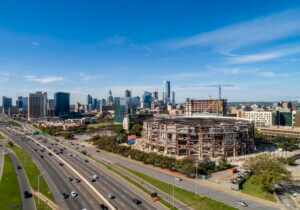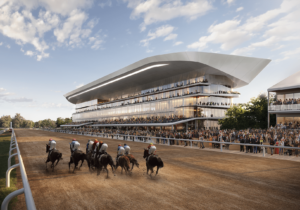For the 2022 Asian Games, the biggest multi-sport event second to the Olympics, New York-based architecture firm Archi-Tectonics has designed a net-zero sports park in Hangzhou, China. The 116-acre development, named Hangzhou Asian Games Park, was designed in collaboration with !melk Landscape Design and Thornton Tomasetti structural engineering. It is the largest project to date for Archi-Tectonics, representing over two million square feet of facilities woven together across a mile-long park, including two sports stadiums, fitness and visitor centers, a shopping mall, and 140,000 square feet of wetlands.
Winka Dubbeldam, the founder of Archi-Tectonics, has said that the design of Hangzhou Sports Park intends to fuse its landscape and building facilities as a way to anticipate its long-term use after the games take place three years from now. In an effort to reduce waste, the earth excavated during construction will be transformed into artificial hills throughout the site.
The two sports stadiums are the most prominent features on either side of the park, one a 5,000-seat golden cylinder for tennis tournaments and the other a field hockey arena with a parabolic roof. The two stadiums are connected by a sunken shopping mall marking the center of the site, designed with a green roof that blends into its park surroundings. Described by the firm as a “below-grade retail valley,” the mall interacts with the preexisting Yiyang Road and River.
Hangzhou Asian Games Park broke ground in July 2019 and is scheduled to be completed before the Asian Games take place in September of 2022. To oversee the project, Archi-Tectonics opened its third office at the Architectural Design and Research Institute at Zhejiang University in Hangzhou (its first two are in New York and Amsterdam). In addition to the sports park, the Asian Games project will also bring new metro lines and inner-city railways.











